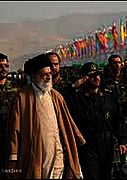“Moderation” Means “Tricking the Enemy”
» Khamenei’s Appointees Elucidate his Recent Message
Two days after Iran’s supreme leader set the goals of the country’s foreign policy, and at the same time stressed his views and directed the country’s newly elected president, Hassan Rowhani, on domestic issues, a number of ayatollah Khamenei’s representatives and the commander of the Basij para-military force that operates under the control of the Revolutionary Guards (IRGC), presented their explanations to clarify the leader’s most recent message – should there be any doubt - and advised Rowhani to be more thinking about how to “deceive” the world rather than be in “moderation” with it.
Speaking to Fars news agency which belongs to the IRGC Guards general Mohammad-Reza Naghdi said, “The supreme leader defines the high-level policies of the state. In his most recent speech, ayatollah Khamenei has clearly identified the priorities of the next administration which he said was ‘the advancement of the economy and science in the country’ which the coming administration would most certainly pursue.”
He then turned to president-elect’s central campaign theme of “moderation” and said, “Moderation has a religious and an Islamic meaning, while also carrying a Western interpretation. The newly-elected president most certainly does not have the Western interpretation of moderation in mind because that definition means heeding to problems and animosities. In contrast, the core meaning of moderation is to remain on the rightful course without being extreme. Moderation is not about taking a middle course between what is right and wrong.”
“Western moderation means taking a course of action that is mid-way between what is right and what is void. Islamic moderation is staying on the path of the Imam’s course, that of velayat (religious leader) and the original course of the revolution,” the deputy supreme IRGC commander continued. “This theme was well chosen and we hope that moderation will take place as it is defined in our culture.”
On July 22, a day after ayatollah Khamenei’s remarks to the “officials of the regime” - in which he essentially said that when an enemy blocked the country’s path, the leaders of the regime needed to find ways to continue their path while preventing the enemy from blocking them – cleric Mohammad-Reza Tooysarkani, ayatollah Khamenei’s representative in the Basij also commented on his message. “We should not view moderation to be the opposite of possessing the jihadi spirit,” he said. But he went further and encouraged president-elect Rowhani to be deceitful in his behavior. “Just as the supreme leader announced, moderation does not mean retreat vis-à-vis the desires of the enemy. Rather than being deceived by the enemies, we must deceive them, through the use of definitive measures.”
These remarks came immediately after Khamenei made his important speech in the presence of the “officials of the regime” on July 21st 2013. In that talk, Khamenei also said, “The Americans untrustworthy, unreasonable and not honest in their actions. The four months since our last talk has proved this. The positions of American officials and statesmen have shown that what we had said, that we are not optimistic, is correct. They have themselves confirmed this through their actions. The British and others have done the same, in their own ways. There is no issue in moderating with the world. We had been moderate from the beginning. But while being in moderation the enemy must be recognized and understood: his tricks must be understood, and the basic and general goals must be kept in mind.”
Rowhani’s campaign messages, his interviews and comments after his election in which he has said he would follow moderation in his dealings with the world community have created a cautious optimism in the West that there may be some changes in the nuclear and human rights talks between Iran and the West. A recent letter in the US signed by some 130 bipartisan congressmen sent to president Barack Obama which calls for diplomacy with Iran because of Rowhani’s moderate stands is an example of this change. At the same time, the US Congress has put on hold a plan to institute new sanctions against the Islamic republic.
But since ayatollah Khamenei’s hardline message and that he is not optimistic about talks with the West and the US, Congress has returned the new sanctions to its agenda, even though it appears that the review of the new sanctions would take place in the second half of August, after Rowhani moves into his new post.
Khamenei’s most recent message seems to be against Rowhani’s theme of moderation with the world and the remarks by his appointees send a clear message to the newly elected president that he is expected to merely implement the policies set by the supreme leader, rather than attempt to devise his own or deviate from them.


